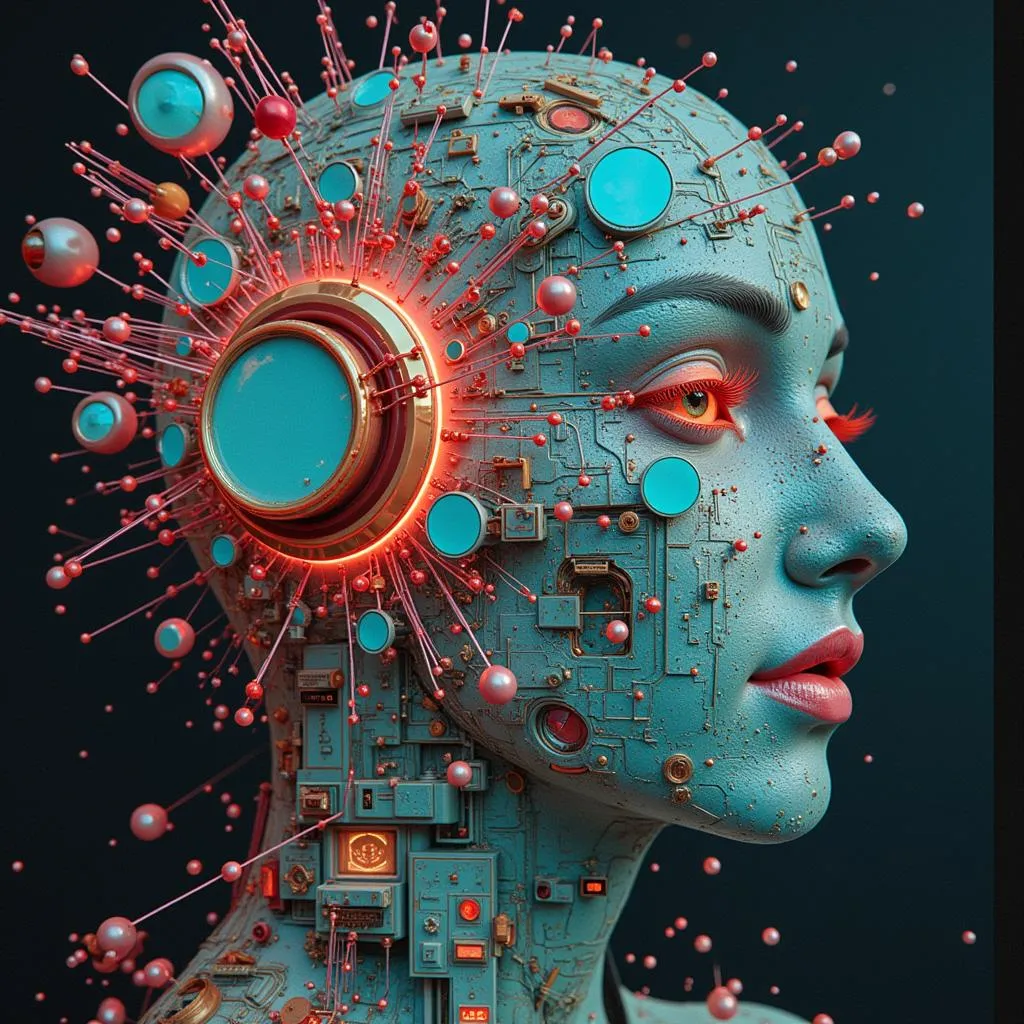Jean Baudrillard, the renowned French sociologist and cultural theorist, developed groundbreaking ideas about consumerism and its profound impact on modern society. His work, particularly his concept of the “consumer society,” remains strikingly relevant in today’s hyper-consumerist world. Baudrillard argued that in advanced capitalist societies, consumption has become far more than just acquiring material goods. It’s evolved into a symbolic system that shapes our identities, relationships, and even our understanding of reality.
 Image depicting the concept of consumer society through visual metaphors related to Baudrillard's theories.
Image depicting the concept of consumer society through visual metaphors related to Baudrillard's theories.
Decoding the Consumer Society: What Does It Mean?
Baudrillard posited that in a consumer society, the meaning and value we attach to objects go beyond their practical use. We consume not just for basic needs but to construct an image of ourselves, express our social status, and participate in a system of signs and symbols. This system, he argued, is driven by what he termed “sign value.” Sign value refers to the social meaning and prestige associated with a product, often detached from its actual function or production cost.
For example, a luxury watch might tell time, but its high price tag and brand name contribute more to its desirability than its timekeeping accuracy. This emphasis on sign value, according to Baudrillard, creates a culture where individuals are defined by what they own and consume, leading to a constant pursuit of the “next big thing” to maintain a desired social image.
Simulacra and Simulation: Blurring the Lines Between Reality and Representation
One of Baudrillard’s most intriguing concepts is the idea of “simulacra” and “simulation.” He argued that in a consumer society, mass media and technology create a hyperreality – a simulated world that becomes more real than real. Simulacra are copies without an original, signs that refer only to other signs, ultimately bearing no relation to any external reality.
Think about reality TV shows. They present a carefully constructed version of reality, edited and packaged for entertainment. Over time, these simulations start to shape our perceptions of the real world, blurring the lines between what is authentic and what is manufactured. This hyperreality, Baudrillard argues, can make it challenging to distinguish between genuine experiences and simulated ones, leading to a sense of alienation and detachment.
 Image illustrating the concept of simulacra and simulation in the context of consumerism, potentially using examples from media, advertising, or social media trends.
Image illustrating the concept of simulacra and simulation in the context of consumerism, potentially using examples from media, advertising, or social media trends.
The Implications of Living in a Baudrillardian Consumer Society
Baudrillard’s theories raise critical questions about the social and psychological consequences of living in a consumer-driven world. Here are some implications to consider:
- Erosion of Identity and Authenticity: When our identities are so closely tied to what we consume, it can lead to a sense of emptiness and a constant need for external validation.
- Social Division and Inequality: The consumer society often exacerbates social divisions, as people are categorized and ranked based on their purchasing power.
- Environmental Impact: The insatiable appetite for new products and experiences contributes significantly to environmental degradation and resource depletion.
- Loss of Meaning and Purpose: In a world saturated with simulated experiences and fleeting trends, finding genuine meaning and purpose can become challenging.
Navigating the Consumer Landscape: Critical Consumption and Mindful Engagement
While Baudrillard’s observations might paint a bleak picture, they also offer an opportunity for reflection and conscious action. We can navigate the consumer landscape more mindfully by:
- Becoming Critical Consumers: Questioning the messages we’re bombarded with by advertising and media.
- Prioritizing Experiences over Possessions: Investing in meaningful experiences and relationships rather than material goods.
- Supporting Ethical and Sustainable Practices: Making conscious choices that align with our values and minimize our environmental footprint.
 Image depicting individuals engaging in mindful consumption practices, such as buying locally, choosing sustainable products, or prioritizing experiences over material possessions.
Image depicting individuals engaging in mindful consumption practices, such as buying locally, choosing sustainable products, or prioritizing experiences over material possessions.
Conclusion: Moving Towards a More Conscious Future
Jean Baudrillard’s work serves as a stark reminder of the pervasive influence of consumerism in our lives. By understanding his theories, we can become more aware of the forces shaping our desires and choices. By embracing critical consumption, prioritizing meaningful experiences, and advocating for a more equitable and sustainable world, we can strive to create a society where consumption is driven by genuine needs and values rather than manufactured desires.
FAQs about the Consumer Society and Jean Baudrillard
- What is the main argument of Jean Baudrillard’s consumer society theory?
Baudrillard argues that in advanced capitalist societies, consumption has become a system of signs and symbols that shapes our identities and perceptions of reality, often detached from the actual use value of goods. - What are some examples of simulacra in today’s world?
Examples include reality TV shows, social media profiles that present curated versions of ourselves, and even theme parks that offer simulated experiences of different places and times. - How can we resist the negative effects of consumerism?
We can resist by becoming more conscious of our consumption habits, questioning advertising messages, prioritizing experiences over possessions, and supporting ethical and sustainable practices.
Need Support in Building a More Peaceful World?
Contact us:
Phone Number: 02043854663
Email: [email protected]
Address: Khu 34, Bắc Giang, 260000, Vietnam
We have a 24/7 customer support team ready to assist you.